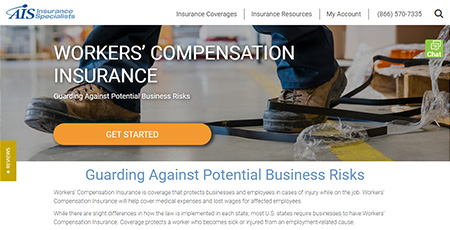Workers Compensation Insurance – An Overview
There is a lot to say about Workers Compensation Insurance. That’s because the details vary depending on whether you’re the employer, the employee, and by state. Here, we’ll talk about Workers Comp as it relates to you, the employer. In general, Workers Compensation (or Workers Comp) covers the income and medical care of an employee that is injured or becomes ill as a result of their work. This very different from incidents covered by General Liability Insurance. The benefits associated with Workers Compensation Insurance focus on medical care, supplemental job displacement, temporary disability, permanent disability, and death benefits.
Do I Need Workers Comp for My Business?
Whether or not you need Workers Comp Insurance for your business will depend on your state laws. However, most states require that businesses purchase Workers Compensation Insurance. Failing to purchase Workers Comp Insurance can result in jail time and heavy fines. You’ll want to check with your state laws surrounding Worker’s Comp. Additionally, you’ll have to purchase this insurance from a licensed Business Insurance agency. Agents, such as the ones at AIS Insurance, will know the ins-and-outs of Worker’s Compensation Insurance based on your state and type of business. It’s usually quicker to get information from a licensed Business Insurance agent than to search through Google and government sites.
How Does Workers Compensation Work?
Benefits
Workers Compensation Insurance benefits both employers and employees. However, employees don’t contribute to the cost. For employees who suffer a covered injury or illness, it can help with the cost of lost wages, medical treatment, rehabilitation, and even compensation for permanent injury. Additionally, should the affected employee pass away, there may be compensation to the survivors. The benefit of this insurance for the employer/owner is legal and financial protection—employers won’t have to be financially responsible for costs incurred by the claims.
Claims
When an employee is hurt or ill as a direct result of their work, they must formally report it to their employer. Injuries and illnesses should typically be reported within 30 days of an injury or of symptoms arising. Then, they’ll also have to file a claim with the state’s workers compensation agency. It is important that this is done quickly as there is a time frame to file claims. Again, these details vary by state. For example, in California, an injured employee has a year to file a claim. While in New York, the statute of limitations is two years.
Employers and insurance companies also have deadlines to be aware of for investigation, processing, and approving claims. As soon as an employer is notified of an injury or illness, they must provide the affected employee with all necessary paperwork preferably before the employee receives medical attention. Then, the employer is responsible for filing a claim with the insurer for approval.
From here, the outcome will vary. Claims may be approved or denied by the insurer and appeals may be filed as a result. In any case, there will be continuous contact between the employer, employee, medical providers, and the insurer until the case is resolved, hopefully, without the need for litigation. The process can be lengthy and complex. It is important to follow claim procedures as established by your insurer and state regulations.
Litigation
Most Workers Compensation Insurance policies include Employer’s Liability Insurance (ELI). It protects business owners from lawsuits that arise as a result of workplace injuries or illnesses. For example, after a Workers Comp claim has been filed, an employee may later file a lawsuit alleging that the illness or injury as a result of the employer’s negligence. Remember, a Worker’s Comp claim doesn’t mean you were sued. ELI is coverage that compliments your Workers Comp policy. Finally, it’s important to note that Employer’s Liability Insurance will not be included in your Workers Comp policy if it’s purchased from a State Fund. We explain State Funds ahead.
 How Do I Buy Workers Comp Insurance?
How Do I Buy Workers Comp Insurance?
Workers Comp Insurance is mandatory in most states and you have more than one option for purchasing a policy. Depending on your state and specific situation, Worker’s Compensation Insurance can be purchased through a licensed insurance agency or company, state compensation insurance fund (state fund), state-run Worker’s Comp pool, or self-insure.
Licensed Insurance Agency
A Business Insurance Specialist, such as with AIS Insurance, can assist a business owner with purchasing a Worker’s Comp policy. Agents you transact with must be licensed to ensure you’re provided with adequate information unique to your business and state regulations. Agents will be able to gather all relevant business information and compare rates and coverage from various insurance companies. Building a relationship with your agency of choice is important as they’ll continuously keep your best interest in mind as your business needs change.
State Compensation Insurance Fund (State Fund)
State funds are, as the name suggests, operated by the state. They provide Workers Compensation Insurance on a non-profit basis. Often, these serve as an alternative marketplace for a business that can’t be insured through private insurers. There are some states, such as Ohio and Washington, that require that Workers Comp Insurance be purchased only through their state fund. These are known as monopolistic state insurance funds. While it may be convenient to have only once source for insurance, there are potential drawbacks as well. Monopolistic funds won’t offer Employer’s Liability Insurance, in which case business owners must purchase additional coverage known as stop-gap coverage.
State-Run Worker’s Comp Pool
State-run Worker’s Comp pools work similarly to regular state funds and can present similar disadvantages. However, an added benefit is the potential for premiums on a Workers Comp policy may be lower; the more people are contributing to the pool.
Self-Insure
Self-insuring for Workers Compensation is an option some businesses have, but it’s not available to all. Typically, very large companies may opt to self-insure if that option is available to them. If you think your business would like to explore this option, a certificate of approval from the Department of Industrial Relations (DIR) will be required. The DIR is responsible for overseeing and regulating Workers Compensation Self-Insurance and will typically require a security deposit from your business.

How much does Workers Comp Insurance Cost?
The cost of purchasing Worker’s Comp Insurance for your business will depend on several factors specific to your business. Because Worker’s Compensation Insurance is managed at the state level, this, too, plays a role in the cost of premiums. The best way of knowing what you can expect to pay for this coverage is to receive a couple of quotes from different insurance companies. AIS Insurance can easily assist you by shopping through various carriers and giving you the options that fit your needs best.
Here are a few key factors in the cost of a Worker’s Comp policy:
- Business region
- Location of employees
- Number of employees
- Annual payroll
- Industry and risk factors (your business will be classified according to this)
- Coverage limits
- Claims history
Recap
Workers Compensation Insurance helps cover the income and medical care of an employee that becomes injured or ill as a direct result of their work. Business owners in almost every state are required to purchase Workers Compensation Insurance. Worker’s Comp Insurance is regulated at the state level. That will affect the specific regulations to follow and your options for purchasing a policy. The best method for learning about and purchasing a policy will be through a licensed Business Insurance Specialist. Your cost will depend on several factors such as location, type of business, number of employees and more.
The information in this article is obtained from various sources. This content is offered for educational purposes only. It should not replace the advice of a qualified professional. The definitions, terms and coverage in a given policy may be different than those suggested here. No warranty or appropriateness for a specific purpose is expressed or implied.


